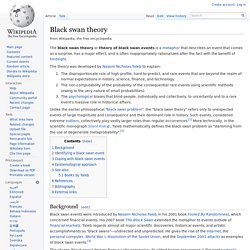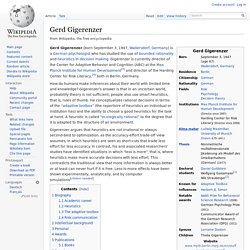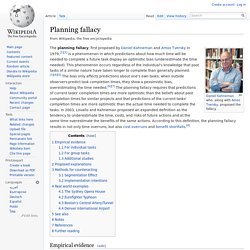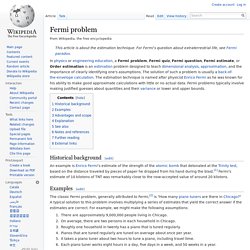

BBST Courses. | Welcome | Foundations | Bug Advocacy | Test Design | Exploratory Testing | Taking Exams | Policies | Extras | Instructors Course | Metrics | Engineering Ethics | Please Note: BBST is a Registered Trademark of Kaner, Fiedler & Associates.

This site provides Creative Commons-licensed instructional materials (slides and videos) to teach black box software testing. Black box testing is the craft of testing a program from the external view. We've organized the materials into self-contained sections. Click on the tabs to navigate from section to section. We are also developing instructor-support materials, provided under the Instructors Course tab. We've designed some materials to support self-study and self-training. Your suggestions and bug reports are very welcome. Cem Kaner, J.D. Black swan theory. The black swan theory or theory of black swan events is a metaphor that describes an event that comes as a surprise, has a major effect, and is often inappropriately rationalized after the fact with the benefit of hindsight.

The theory was developed by Nassim Nicholas Taleb to explain: The disproportionate role of high-profile, hard-to-predict, and rare events that are beyond the realm of normal expectations in history, science, finance, and technology.The non-computability of the probability of the consequential rare events using scientific methods (owing to the very nature of small probabilities).The psychological biases that blind people, individually and collectively, to uncertainty and to a rare event's massive role in historical affairs.
Unlike the earlier philosophical "black swan problem", the "black swan theory" refers only to unexpected events of large magnitude and consequence and their dominant role in history. Background[edit] Taleb asserts:[8] TEDxNorrkoping. Gerd Gigerenzer on Simple heuristics that make us smart. Gerd Gigerenzer. Gerd Gigerenzer (born September 3, 1947, Wallersdorf, Germany) is a German psychologist who has studied the use of bounded rationality and heuristics in decision making.

Gigerenzer is currently director of the Center for Adaptive Behavior and Cognition (ABC) at the Max Planck Institute for Human Development[3] and director of the Harding Center for Risk Literacy,[4] both in Berlin, Germany. How do humans make inferences about their world with limited time and knowledge? Gigerenzer’s answer is that in an uncertain world, probability theory is not sufficient; people also use smart heuristics, that is, rules of thumb. He conceptualizes rational decisions in terms of the “adaptive toolbox” (the repertoire of heuristics an individual or institution has) and the ability to choose a good heuristics for the task at hand. A heuristic is called “ecologically rational” to the degree that it is adapted to the structure of an environment. TEDxNorrkoping. Gerd Gigerenzer on Simple heuristics that make us smart. Planning fallacy.
The planning fallacy, first proposed by Daniel Kahneman and Amos Tversky in 1979,[1][2] is a phenomenon in which predictions about how much time will be needed to complete a future task display an optimistic bias (underestimate the time needed).

This phenomenon occurs regardless of the individual's knowledge that past tasks of a similar nature have taken longer to complete than generally planned.[3][4][5] The bias only affects predictions about one's own tasks; when outside observers predict task completion times, they show a pessimistic bias, overestimating the time needed.[6][7] The planning fallacy requires that predictions of current tasks' completion times are more optimistic than the beliefs about past completion times for similar projects and that predictions of the current tasks' completion times are more optimistic than the actual time needed to complete the tasks.
Empirical evidence[edit] Fermi problem. This article is about the estimation technique.

For Fermi's question about extraterrestrial life, see Fermi paradox. In physics or engineering education, a Fermi problem, Fermi quiz, Fermi question, Fermi estimate, or Order estimation is an estimation problem designed to teach dimensional analysis, approximation, and the importance of clearly identifying one's assumptions. The solution of such a problem is usually a back-of-the-envelope calculation. The estimation technique is named after physicist Enrico Fermi as he was known for his ability to make good approximate calculations with little or no actual data. Fermi problems typically involve making justified guesses about quantities and their variance or lower and upper bounds. Historical background[edit] Examples[edit] The classic Fermi problem, generally attributed to Fermi,[2] is "How many piano tuners are there in Chicago?
" From these assumptions, we can compute that the number of piano tunings in a single year in Chicago is , so.